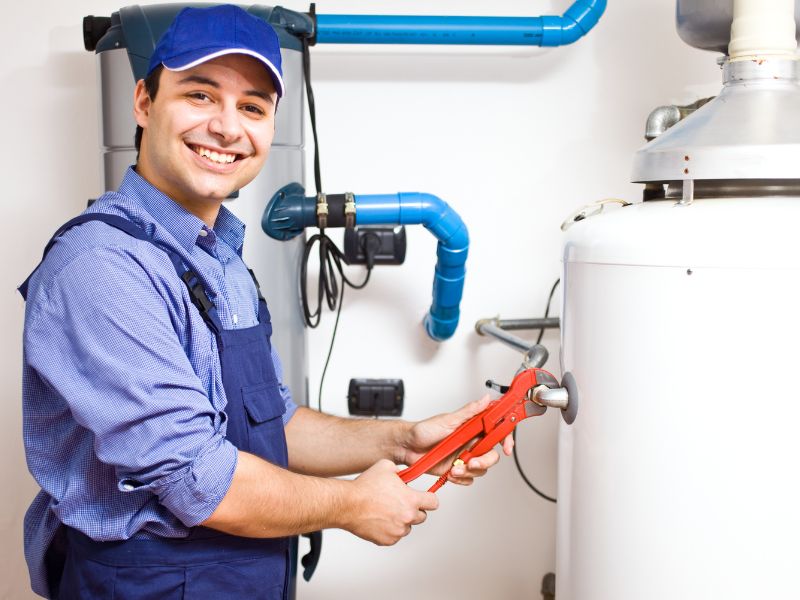In the quest for home efficiency and sustainability, Gas Condensing Storage Water Heaters emerge as a beacon of innovation and environmental stewardship. These systems are not just appliances but investments in the future of energy consumption and conservation. With an emphasis on operational efficiency, cost-effectiveness, and environmental benefits, let’s explore the transformative power of these heaters, spotlighting popular models in the USA and their cost implications.
Understanding Gas Condensing Storage Water Heaters
At the heart of Gas Condensing Storage Water Heaters is a simple yet profound principle: capturing heat from exhaust gases that would otherwise be wasted. This approach significantly boosts energy efficiency, making these heaters a superior choice over traditional models.
Operational Excellence: These units utilize a heat exchanger to absorb heat from gas combustion and exhaust, effectively recycling energy to heat water. The condensed vapor, a byproduct of this process, further contributes to the heating efficiency.
Core Components: Integral to their design are the gas burner, heat exchanger, condensate drain, and storage tank. This synergy of components ensures optimal heat capture and water heating.
The Advantages Unveiled
Efficiency and Economy: The hallmark of Gas Condensing Storage Water Heaters is their exceptional energy efficiency. Models like the Rheem Prestige® Series High Efficiency Condensing Power Direct Vent and the Noritz NRCB Combi Water Heater exemplify this, boasting energy factors (EF) well above 0.90, significantly higher than the 0.60 – 0.70 range of traditional units. This efficiency translates into tangible cost savings, with potential annual savings up to $100 – $200, depending on usage patterns.
Environmental Impact: By maximizing the use of natural gas and reducing emissions, these heaters align with the growing demand for green technologies. They are a step forward in reducing the carbon footprint of residential and commercial properties.
Durability and Incentives: Built to last, these units often come with longer warranties and potential eligibility for rebates and tax incentives, making the initial higher investment more palatable over time.
Market Leaders and Pricing
When it comes to choosing a Gas Condensing Storage Water Heater, the U.S. market offers several reputable options:
- Rheem Prestige® Series: Known for reliability and high performance, models in this series can range from $1,200 to $2,500, excluding installation.
- Noritz NRCB Combi Water Heater: This unit is not only efficient but also serves as a space heater, priced around $2,000 to $3,000.
- Navien Premium Efficiency models (NPE-A and NPE-S): These units are praised for their advanced technology and energy savings, with prices between $1,800 and $3,000.
Installation and Considerations
While the benefits are compelling, the installation of Gas Condensing Storage Water Heaters demands careful planning. Space requirements, proper ventilation, and the management of condensate are critical considerations. The initial costs, including the heater and installation, can range from $3,000 to $5,000, influenced by model choice and specific home configurations.
Maintenance for Longevity
To ensure these heaters operate at peak efficiency, routine maintenance is essential. This includes annual inspections, cleaning of the heat exchanger, and proper management of the condensate system. These proactive steps can extend the life of the heater and safeguard its efficiency.
Overcoming Challenges
The higher upfront cost and complexity of installation are notable challenges. However, the long-term savings, combined with potential rebates and the environmental benefits, present a compelling case for their adoption.
The Path Forward
As the market evolves, Gas Condensing Storage Water Heaters are set to play a pivotal role in the transition towards more sustainable energy solutions in American homes and businesses. Innovations focusing on integration with renewable energy sources, enhanced efficiency, and smart technology are on the horizon, promising to make these systems even more appealing.
Gas Condensing Storage Water Heaters represent a significant advancement in water heating technology. Offering a blend of efficiency, environmental benefits, and long-term savings, they stand out as a smart choice for those looking to upgrade their water heating system. With models like the Rheem Prestige®, Noritz NRCB, and Navien NPE series leading the charge, American consumers have excellent options at their disposal. Investing in a Gas Condensing Storage Water Heater is more than just purchasing an appliance; it’s a commitment to a more efficient, sustainable, and cost-effective future. As this technology continues to evolve, it will undoubtedly play a crucial role in shaping the energy landscape of the United States.

